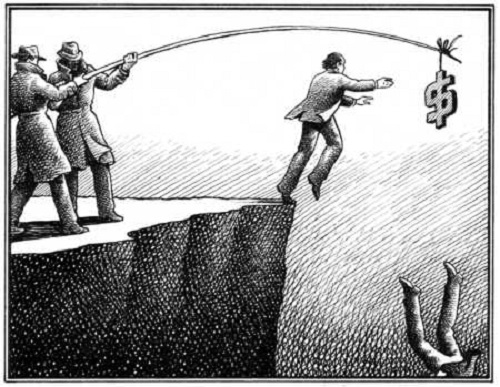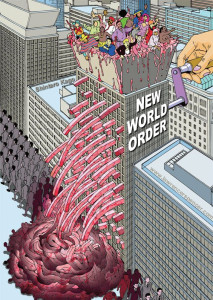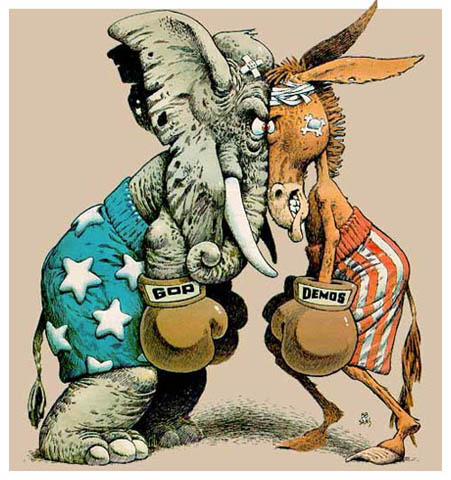“Just because you do not take an interest in politics doesn’t mean that politics won’t take an interest in you.” (Pericles Funeral Oration in “The History of the Peloponnesian War” written by Thucydides in 431 B.C.E.) Are there “systematic forces that sometimes turn good economics into bad politics, with the latter unfortunately trumping the economic good”? (“Economics versus Politics: Pitfalls of Policy Advice” by Daron Acemoglu and James Robinson, Massachusetts Institute of Technology, Department of Economics, Working Paper #13-08 published on February 28, 2013) “[T]he extant political equilibrium may crucially depend on the presence of market failure.”
The job that’d gotten me into the biz was CFO for Bronx Lebanon Hospital’s Special Care Center. What was ‘special’ compared to other Residential Health Care Facilities (RHCFs) – better known as Nursing Homes for the frail elderly – our RHCF license had been fast tracked under a New York State Department of Health (NYS DOH) pilot program for the AIDS population. HIV had become epidemic in the 1990s, especially so in the inner cities.
Production technology and organizational dynamics have been a dynamic duo, ever since the Industrial Revolution first got up a head of steam. “In the first three chapters and in other passages of The Wealth of Nations, Adam Smith advances the thesis that a high level of division of labor is the most important explanation of the income level reached by developed countries.” (“Division of Labor and Economic Growth” by Andrea Mario Lavezzi in a paper prepared for the Conference on Old and New Growth Theories in Pisa from October 5-7, 2001)
“Smith had in mind…endogenous technological progress…The very presence of increasing returns, generated by the process of division of labor…is due to ‘reasons that are fundamental to the nature of technological processes’.”
“[C]ompetition is related to a change in the structure of the economy, as new opportunities for division of labor are exploited and new sectors and products appear…Smith is advancing here…a disequilibrium theory in the sense that he views the economy as in a state of constant and internally generated change…[W]hen Smith talks about a growing economy, he has in mind an economy undergoing qualitative changes, moving from a simple to a more complex structure. ”
“[H]e pointed also to demand as a relevant factor in the growth process…[I]f one has to indicate a single factor relevant for economic progress, that is the extent of the market and…‘no other hypothesis so well unites economic history and economic theory’. The extent of the market relevant for the decisions of businessmen may well be potential…[T]he attention paid by the managers of modern industries to potential market was a ‘great change’ with respect to the past. Therefore ‘the search for markets is…a matter of…finding an outlet for a potential demand’.”
Epidemics push just about every button there is in government and healthcare enterprise. NYS Medicaid pushed the price (reimbursement rate) button, which signaled Bronx Lebanon Hospital with an incentive to organize a division of (medical) labor with specialized (pharmacological) production technology “finding an outlet for potential demand” straight out of Adam Smith’s 1776 textbook: The Wealth of Nations.
THE HIDDEN SUBSIDY FOR SELF-DECEPTION
Since Long Term Care (LTC) Medicaid costs the public treasury so much more than Community Medicaid for a doctor’s office visit – $373/day = $136,200/year in NYC – a lot more due diligence goes into the approval of applications that originate upon admission to an RHCF. (“Estimated Average New York State Nursing Home Rates”, New York State Partnership for Long Term Care) With a frail elderly population, the typical Nursing Home doesn’t get all that much turnover. The numbers are actuarially predictable. New York State Medicaid was staffed, by virtue of its budget, for an average six month billing eligibility approval cycle.
Skimping on staff in agencies that administer such income (welfare) re-distribution postpones cash flow to Nursing Home operators, who’re sandbagged into subsidizing the public purse out of their own pockets to effectively fund legislatively mandated staff shortages. The cost of financing this working capital comes back eventually to an RHCF in its rates. These are prospective in their application – meaning that the capital component of a Medicaid reimbursement rate becomes not only permanent but also permanently inflationary – as operators continually have to borrow that much more for the interest on their permanently interim debt burdens. Why exactly are the (medical) bills so high? Do the math.
This is just one example of an inherent conflict in public healthcare policy referring back to “systematic forces that sometimes turn good economics into bad politics, with the latter unfortunately trumping economic good”. Even though public policy makes medical care for the elderly and indigent a ‘public good’, it’s never a done deal for the ‘haves’ who don’t want to empty their own pockets for the ‘have-nots’.
Misbegotten practices like this operate pretty much the same as the federal government’s budget deficit, only New York is constitutionally mandated to balance its state budget. So the practice masks a (payroll) deficit in hidden loans from LTC medical providers doing business with NYS DOH.
Any government that doesn’t cash the checks written into legislation is either organically Keynesian in its fiscal policy (doctrine) or bankrupt in its (deadbeat) business practice. If such is the economic dynamic in penny wise but pound foolish partisanship, “the extant political equilibrium…crucially depend[s] on the presence of market failure”. (“Economics versus Politics: Pitfalls of Policy Advice”)
RENDER UNTO CÆSAR
So much market failure surrounding healthcare correlates empirically with so much government spending so schizophrenically. During the dozen years between 2000 and 2011, government spent in aggregate $11,814.5 trillion on healthcare from all sources. (The U.S. Government’s Center for Medicare and Medicaid Services “National Health Expenditure Tables” current through 2011) Whoever aims to part these deep waters better check the shoe size they’re edging to fill: “And Moses stretched out his hand over the sea; and the LORD caused the sea to go back by a strong east wind all that night, and made the sea dry land, and the waters were divided.” (The Holy Bible, Exodus 14:21)
President Obama’s 1.01% margin of victory in the popular vote count closely matches government’s healthcare spending margin over private sponsorship. Whether this is just a statistical coincidence or people voted their pocketbooks, “There are 47 percent of the people who will vote for the president no matter what. All right, there are 47 percent who are with him, who are dependent upon government, who believe that they are victims, who believe the government has a responsibility to care for them, who believe that they are entitled to health care”. (Mitt Romney) Talk about a self-fulfilling prophecy.
“House Republicans and Budget Chairman Paul Ryan are making one more run at repealing Obamacare and “voucherizing” Medicare. Pretty much everyone, including their own caucus recognizes this is an exercise in futility, and even the Wall Street Journal calls it ‘provocative’…Unfortunately for Ryan and the Republicans, they already campaigned against all of these and got beaten pretty badly last year. Talk about denial. So repealing Obamacare is a dead issue. We’ve heard from the Supreme Court, and we’ve had a national election. The Democrats won. Reform is the law of the land, and we’re not going back…Perhaps Medicare and Obamacare might eventually morph together and give us some version of “Medicare for everyone.” If you think that’s impossible, or believe ideology will trump common sense, just ask any senior or doctor, “Who do you hate more, Medicare or your insurance company?” The response is almost universal, even among docs who won’t take Medicare because of the low payments. [W]hile the “States of Denial” now strive mightily to smother Obamacare in the cradle, they may unwittingly become the inadvertent midwives of national single-payer, or something very like it.” (“Red States Respond To Obamacare With Angry Tea-Party Denial” by Joe McLean on The Daily Beast on March 20, 2013)
“Suppose…that the struggle for economic advantage were to take place within a framework in which some actors occasionally succeeded in usurping the rights of others…Welcome to politics…From a political standpoint, economic property rights are always up for grabs.” (“The Politics of Structural Choice: Toward a Theory of Public Bureaucracy” by Terry M. Moe in Organization Theory From Chester Bernard to the Present and Beyond, Oxford University Press, 1995) “Political uncertainty is surely of fundamental importance in distinguishing politics from economics…[M]ost of the political struggle is about who will have the rights…to make authoritative decisions for society, and the struggle never ends…Public bureaucracies are not structures of mutual advantage…they are essentially structures of coercion.”
“Political economy, considered as a branch of the science of a statesman or legislator, proposes two distinct objects: first, to supply a plentiful revenue or subsistence for the people, or, more properly, to enable them to provide such a revenue or subsistence for themselves; and secondly, to supply the state or commonwealth with a revenue sufficient for the public services.” (“Adam Smith and The Wealth of Nations” by Professor Charles J. Bullock in Lectures on the Harvard Classics on bartleby.com)
FISCAL FOLLY
Starving an $11,814.5 trillion beast just makes it hungry. We only stay on top of the food chain by taming such a beast – so it doesn’t consume us – instead of the other way around. “Economic actors seek to structure their relationships – their firms – as efficiently as possible, and the economic system as a whole operates to weed out those that fail. Political actors, on the other hand, are typically not concerned with efficiency in the usual economic sense, and the political system does not weed out the inefficient.” (“The Politics of Structural Choice: Toward a Theory of Public Bureaucracy”)
While LTC Medicaid crept along on a six month approval cycle, Bronx Lebanon Hospital’s Special Care Center was turning over the entire house about every three weeks. Gurneys were shuttling across the street – to the hospital’s mortuary – more often than we served meals to those waiting for their turn.
By the time eligibility was approved for us to bill, most of our patients had already dropped off the Patient Accounts System’s ‘live’ roster. We had to pull their files out of the rack, eyeball all the paper, code the bills by hand and drop them in the snail mail. For all of the time it took us to bill like this, our claims were going stale on LTC Medicaid’s cycle, requiring administrative appeal in order to get each of them paid. Cash flow was snarled like a bottleneck on the Cross Bronx Expressway during rush hour.
Within months of opening its doors for business, the Special Care Center was choking on $40 million in stale Medicaid receivables. Systemic inefficiency was digging a hole in our working capital – which came out of Bronx Lebanon Hospital’s operating budget – whose own working capital came from the proceeds of a New York State guaranteed revenue bond. Coming full circle, it was New York State’s own bottlenecked Medicaid ‘revenue’ that’d been earmarked to pay the bond holders.
Bringing it all back to Wall Street, there was finally a revelation “whatsoever a man soweth, that shall he also reap”. (The Holy Bible, Galatians 6:7) To cop a capital market cliché, you’ve got to spend some money in order to save more. Whoever passes this fiscal policy buck on a blind tax pivot is more of a fiscal fool than an authentic ‘fiscal conservative’.
While NYS DOH contemplated digesting its own poison pill, we went technological all the way to Israel for a new generation of Patient Accounts System that would maintain history files of our ‘live’ roster that could be queried by patient. Although it might not seem today like more than common sense, this was state of the art back then in database technology.
IF YOU BUILD A BETTER MOUSE TRAP, THE WORLD
WILL BEAT A PATH TO YOUR DOOR AND
T-REX WILL BE FIRST IN LINE WITH A FEROCIOUS APPETITE
You’d expect natural selection to breed the biggest baddest animals ever. “Paleontologists estimate that Tyrannosaurus Rex — T-Rex for short — was 15 feet to 20 feet tall and about 40 feet from head to toe. Recent measurements show that T-Rex weighed as much as 9 tons…Scientists believe that T-Rex could consume up to 500 pounds in one bite.” (“Tyrannosaurus Rex: Facts about T. Rex, King of the Dinosaurs” by Kim Ann Zimmermann in LiveScience on October 10, 2012) From the top of the food chain, you don’t have to worry so much about competition as about the balance of nature keeping pace with your appetite.
Even T-Rex had to diet on scarce resources. “Some 200 years ago, the Reverend Thomas Malthus wrote in his Essay on the Principle of Population that, if mankind’s blind biological urges were left unchecked, population would increase in a geometrical ratio and quickly exhaust the finite resources of nature. ‘The power of population is indefinitely greater than the power in the earth to produce subsistence for man’. Land could be made more productive with more intensive cultivation, but with diminishing marginal returns. Eventual widespread famine was the inevitable fate of mankind.” (“Escaping the Malthusian Trap” by Fred L. Smith, Jr. and Gregory Conko in an Op Ed for the Competitive Enterprise Institute on June 1, 1999)
“Malthus’s book is well known because it gave Darwin the idea of natural selection. Reading of the struggle for existence that Malthus predicted, Darwin wrote in his autobiography, ‘It at once struck me that under these circumstances favourable variations would tend to be preserved, and unfavourable ones to be destroyed…Here then I had at last got a theory by which to work’.” (“Breaking out of The Malthusian Trap” by Nicholas Wade in The New York Times published on August 7, 2007)
Pivoting from “diminishing marginal returns” that would “exhaust the finite resources of nature” to “any variation…if it be in any degree profitable to an individual of any species…will tend to the preservation of that individual”, thus, any species of enterprise that escapes the trap of diminishing marginal returns from scarce resources ought to beat out the competition. (“On the Origin of Species, 1st Edition” by Charles Darwin first published in 1859) If you build a better mouse trap, Charles Darwin predicted that the world would beat a path to your door and that T-Rex would be first in line with a ferocious appetite.
The T-Rex phenomenon persists in a species with both “blind biological urges” and a ferocious appetite for the ministry of medicine. In exhausting “the finite resources of nature”, the Malthus Trap also lurks in a U.S. budget deficit that’ll consume the entire national income within ten years on a trajectory to “be twice the size of the economy and still expanding quickly”, according to the Congressional Budget Office, by 2035. (“Help the Sick and Reduce the Debt: The Moral Economy of the Health-Care Debate”)
“At the beginning of his presidency, Barack Obama argued that the country’s spiraling debt was largely the result of exploding health-care costs…If government gives health insurance to 33 million uninsured, that costs. Costs a lot. There’s no free lunch…The Congressional Budget Office’s latest estimate is that Obamacare will add $1.76 trillion in federal expenditures through 2022. And, as one of the Medicare trustees has just made clear, if you don’t double count the $575 billion set aside for the Medicare trust fund, Obamacare adds to the already crushing national debt.” (Charles Krauthammer in “The Buffett Rule: Free-Lunch Egalitarianism” on National Review Online on April 12, 2012)
LET NOT HIM THAT GIRDS ON HIS ARMOR
BOAST HIMSELF AS HE THAT PUTS IT OFF
Now you know exactly why “real health care spending…has increased by 12.7%…[while] real GDP excluding health spending…is now 0.2% below its December 2007 level” (“Health Sector Economic Indicators Briefs: March 2013 Spending Brief”, Altarum Institute) and why job growth is so much more robust in the belly of the beast (“Health Sector Economic Indicators Briefs: April 2013 Labor Brief”, Altarum Institute), because – during the dozen years between 2000 and 2011 – government spent in aggregate $11,814.5 trillion on healthcare from all sources. (The U.S. Government’s Center for Medicare and Medicaid Services “National Health Expenditure Tables” current through 2011) Medical costs are skyrocketing – in aggregate – because entitled consumption trends towards infinity on a blank government check. It is also because our national single payer writes blank checks that the $2.87 trillion we’ll spend on health care this year “is likely to be $750 billion or 27% more than we would spend if we spent the same per capita as other developed countries.” (“Bitter Pill: Why Medical Bills Are Killing Us” by Steven Brill in Time magazine, published on March 4, 2013) Relying so heavily on 3rd party reimbursements – half of which come from government administered subsistence rations (The U.S. Government’s Centers for Medicare and Medicaid Services “Sponsors of Health Care Costs: Business, Households, and Governments, 1987 – 2009”) – all of the loose ends are tied into a noose around unregulated competition’s neck. Survival of the fittest breeds the biggest baddest animals ever. If T-Rex doesn’t worry about the balance of nature keeping pace with its appetite, scavenging proliferates below it in the food chain.
“Darwin’s brilliance was in…understanding the purposeless, merciless process of natural selection, of life and death in the wild, and…that they are a product of random, repetitive, unconscious behaviors, not conscious design.” (“Monkey Girl: Evolution, Education, Religion, and the Battle for America’s Soul” by Edward Humes, ©2007, published by Ecco)
“Drifting, without aim or purpose, is the first cause of failure. Without a plan…it is easier to follow the course of least resistance, to go with the flow, to drift with the current with no particular destination in mind.…Without definite, precise goals and a plan for their achievement, each decision must be considered in a vacuum. Definiteness of purpose provides context and allows you to relate specific actions to your overall plan.” (Napoleon Hill on Opportunity Beyond Handshake, mervinyeo.com)
Whoever flexes tax cut brawn to wrestle T-Rex is neither the most intelligent of species nor hard wired – with such a transparent fiscal IQ deficit – for adaptability. We’ve done tax cuts for the last 12 years but didn’t get the economic growth. The job creators created jobs in China, instead of here, which is why Foxconn got the growth, while Detroit got to hear the fat lady sing. C’mon, this is dismal science not rocket science. Get a plan. Put a fence around “Jurassic Park”, instead of bending over for T-Rex, while you take pot shots at “Beasts of the Southern Wild”.
In order to dodge fiscal Armageddon, sequester all government health care spending – both Medicare and Medicaid – in one place, where it can be controlled. This probably means an exercise of the Supremacy Clause. It’d be a win for state budgets, a wash on the national books and one of those synergy mergers that’s SOP (Standard Operating Procedure) for private enterprise. Any state that doesn’t opt in would effectively opt out of all federal subsidies. So state participation would be 100% voluntary in compliance with National Federation of Business, et. al., Petitioners v. Kathleen Sebelius, Secretary of Health and Human Services, et. al.
No more tail wagging the dog. Schedule an annual up or down vote on how much in aggregate the nation is willing to spend on healthcare ‘entitlements’. Put a budget in place, just like any private insurance company does in this business. If there’s not enough money in the public treasury to keep a 60 year two-pack a day smoker on a vent for two years in a vegetative state, only in Lake Woebegone are all of the women strong, all of the men good looking and all of the children above average. (“A Prairie Home Companion from American Public Media” with Garrison Keillor from American Public Media) Don’t just earmark how much you’re going to spend but also how you’re going to pay for it.
Lose the political accounting gimmicks. Invest the Medicare Trust Fund’s reserves, just like every private insurance company does, in say an S&P 500 index fund that’d produce some gain for less taxpayer pain. Join the club of Sovereign Wealth Funds (Sovereign Wealth Fund Institute, updated March 2013), instead of accruing boobkas through bogus book keeping.
Everyone should have the choice whether to outsource procurement of medical insurance to whomever will give them the best deal. Take the handcuffs off job creators. Producers ought to have the same access to their tax dollars at work as entitled consumers. Let’s place our bets on competitive market dynamics to sort out who talks the talk from who walks the walk. If the Washington Senators can put a winning team on the field, so long as they play by the same rules, nobody makes it to big leagues who can’t hit the curve ball.
Put an end – once and for all – to everyone with skin in the game rigging the score cards. Cut all strings attached to budget appropriations. Administer Medicare and Medicaid like an insurance company by funding its budget and just doing oversight on compliance against the legislative mandate. If there’s going to be any Congressional meddling, sequester it from influence peddling. Let Congress focus exclusively on how to how to balance costs and benefits, rather than how to trade campaign contributions for corporate welfare entitlements.
“Everywhere man blames nature and fate, yet his fate is mostly but the echo of his character and passions, his mistakes and weaknesses.” (Democritus)
REFERENCE SOURCES
- Pericles Funeral Oration in “The History of the Peloponnesian War” written by Thucydides in 431 B.C.E.
- “Economics versus Politics: Pitfalls of Policy Advice” by Daron Acemoglu and James Robinson, Massachusetts Institute of Technology, Department of Economics, Working Paper #13-08 published on February 28, 2013.
- “Estimated Average New York State Nursing Home Rates”, New York State Partnership for Long Term Care.
- “Division of Labor and Economic Growth” by Andrea Mario Lavezzi in a paper prepared for the Conference on Old and New Growth Theories in Pisa from October 5-7, 2001.
- The U.S. Government’s Center for Medicare and Medicaid Services “National Health Expenditure Tables” current through 2011.
- “Red States Respond To Obamacare With Angry Tea-Party Denial” by Joe McLean on The Daily Beast on March 20, 2013.
- “The Politics of Structural Choice: Toward a Theory of Public Bureaucracy” by Terry M. Moe in Organization Theory From Chester Bernard to the Present and Beyond, Oxford University Press, 1995.
- “Adam Smith and The Wealth of Nations” by Professor Charles J. Bullock in Lectures on the Harvard Classics on bartleby.com.
- “Tyrannosaurus Rex: Facts about T. Rex, King of the Dinosaurs” by Kim Ann Zimmermann in LiveScience on October 10, 2012.
- “Escaping the Malthusian Trap” by Fred L. Smith, Jr. and Gregory Conko in an Op Ed for the Competitive Enterprise Institute on June 1, 1999.
- “Help the Sick and Reduce the Debt: The Moral Economy of the Health-Care Debate” by Yuval Levin for The Witherspoon Institute Public Discourse on August 30, 2011.
- “Breaking out of The Malthusian Trap” by Nicholas Wade in The New York Times published on August 7, 2007.
- “On the Origin of Species, 1st Edition” by Charles Darwin first published in 1859.
- Charles Krauthammer in “The Buffett Rule: Free-Lunch Egalitarianism” on National Review Online on April 12, 2012.
- “Health Sector Economic Indicators Briefs: March 2013 Spending Brief”, Altarum Institute.
- “Health Sector Economic Indicators Briefs: April 2013 Labor Brief”, Altarum Institute.
- “Bitter Pill: Why Medical Bills Are Killing Us” by Steven Brill in Time magazine, published on March 4, 2013.
- The U.S. Government’s Centers for Medicare and Medicaid Services “Sponsors of Health Care Costs: Business, Households, and Governments, 1987 – 2009”.
- “Monkey Girl: Evolution, Education, Religion, and the Battle for America’s Soul” by Edward Humes, ©2007, published by Ecco.
- Napoleon Hill on Opportunity Beyond Handshake, mervinyeo.com.
- National Federation of Business, et. al., Petitioners v. Kathleen Sebelius, Secretary of Health and Human Services, et. al. in the Supreme Court of the United States, docketed September 28, 2011.
- “A Prairie Home Companion from American Public Media” with Garrison Keillor from American Public Media.
- Sovereign Wealth Fund Institute, updated March 2013.
ART & PHOTO REFERENCES
- “Burlesque”: Staten Island Museum.
- “Follow the Money”: www.psylords.info.
- “Time and Tide Wait For No Man”: www.hezeri.hostmyportfolio.com.
- “Fiscal Cliff”: www.oathkeepers.org.
- “Top of the Food Chain”: www.lawrencespencer.com.
- “Down the Drain”: www.belownirvana.com.
- “All Pain, No Gain”: www.artofmanliness.com.
- “Random Selection”: tvtropes.org.







